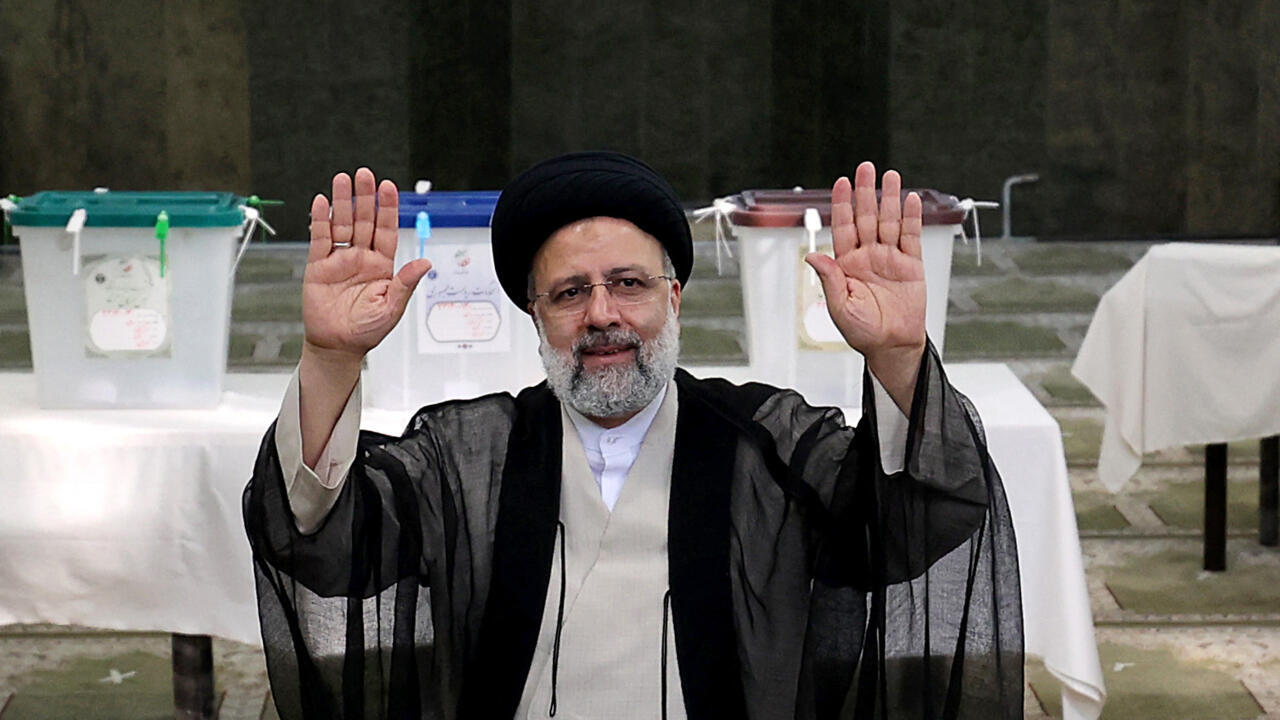The reformist Iranian press called him "a candidate without a rival".
The head of the judiciary, Ebrahim Raïssi, won the presidential election in Iran on Saturday June 19 with more than 60% of the vote, the National Electoral Commission said.
The ultra-conservative was among seven contenders - including five conservatives - allowed by Iran's election monitoring body to run for the presidential race on June 18. Three of them announced Wednesday, June 16 that they were withdrawing, within 48 hours of the opening of the poll. Unhappy candidate in 2017 against Hassan Rohani, Ebrahim Raïssi had returned this time to the front of the Iranian political scene with a boulevard in front of him, also strong of his 38% obtained in the previous election against the outgoing president.
Aged 60, Ebrahim Raïssi is close to Supreme Guide Ali Khamenei, of whom he was a student at the seminary.
Although he wears the turban, he is not an Ayatollah, but a hodjatoleslam, a rank of the lower Shia clergy.
It is because he is also a seyyed - a descendant of the Prophet Muhammad in Shia Islam - that he is allowed to wear the black-colored turban, a distinction popular with the pious electorate.
Placed in key positions of power
The Guide's trusted man, Ebrahim Raïssi is also from the holy city of Mashhad, in northeastern Iran. Also, it is no coincidence that he was propelled in 2016 by Ali Khamenei to the direction of the powerful religious foundation Astan Quds Razavi, manager of the mausoleum of Imam Reza - eighth successor of the prophet according to the Twelver Shiites -, located in this same city of Mashhad.
This major Shiite pilgrimage site drains billions of euros in donations that the Astan Quds Razavi organization is responsible for making fruitful.
The foundation, which functions as both a charity and a holding company, owns a multitude of real estate, farmland and businesses in fields as diverse as construction, tourism or agribusiness.
To take the head of this foundation is to lead an economic empire.
What Ebrahim Raïssi will do for three years, before being called by the Supreme Guide to new functions.
In March 2019, he was appointed head of the Iranian Judicial Authority.
Another influential post for Ebrahim Raïssi, charged by Ayatollah Ali Khamenei to fight vigorously "against corruption".
Loyal as usual, since taking office, he has increased the number of widely publicized corruption trials targeting high state officials - but also, as a new feature, judges. Trials that allow him in passing to oust some sizeable political opponents, like his predecessor at the head of the judicial system, Sadeq Larijani, whose close adviser found himself embroiled in one of these corruption scandals. Sadeq Larijani is the brother of Ali Larijani, tipped for the presidential election but whose candidacy was rejected by the Council of Guardians - probably because of this family affair.
Ebrahim Raïssi has made the fight against corruption one of his campaign slogans.
In a statement, he presented himself as "the adversary of corruption, inefficiency and aristocracy", and promised to fight relentlessly "against poverty" if elected.
A figure hostile to the West
This supporter of a "statist" vision should not advocate for the opening of the Iranian economy to foreign investors. "Iran under Ebrahim Raïssi should continue to invest in infrastructure, water, electricity and health with an economy dominated by the foundations it knows well and the Revolutionary Guards [who also have many companies] ", analyzes economist and Iran specialist Thierry Coville. Several researchers estimate that these parastatal actors currently represent more than 50% of the Iranian economy, but that the phenomenon remains difficult to quantify because these companies do not present "clear traceability" and operate in a "clientelist system".
As for the Iranian nuclear agreement currently being negotiated, although defying the West, Ebrahim Raïssi should not clearly oppose it, believes Thierry Coville, who recalls that it is "the Supreme guide who sets the tone for these negotiations ".
On the question of morals, the ultraconservative, described as "traditionalist", is supported by supporters of the hard line. His father-in-law is none other than Ayatollah Ahmad Alamolhoda, the representative of the Guide in the province of Khorasan (northeast). Known for his austerity, the cleric had distinguished himself in 2016 by the ban on Iranian pop concerts in the city of Mashhad, placed under his religious authority, while these, in full swing , had been authorized in the other large cities of modernized Iran.
Among human rights organizations and more particularly among the Iranian diaspora, the name of Ebrahim Raïssi recalls dark times in the Islamic Republic.
Possible successor to the Supreme Leader
Some see Ebrahim Raïssi as a probable successor to the Guide.
Past the head of the financial empire of the Foundation of the Mausoleum of Imam Reza, then at the heart of the Iranian judicial system, Ebrahim Raïssi has also recently been elected vice-president of the Assembly of Experts, the body in charge of to propose a Supreme Leader in the event of the disappearance of Ayatollah Ali Khamenei.
He only needed a place at the head of the executive to have toured Iranian institutions and acquire the legitimacy of the people.
Note that Ali Khamenei was himself President of the Islamic Republic when he was called to occupy the post of Supreme Leader in 1989, upon the death of Ayatollah Khomeini.
The advanced age of Ali Khamenei, 82, and questions about his state of health suggest that the future president could be the one who will live the succession of the number one of the Iranian state.
Also, the election could ultimately serve as a springboard for Ebrahim Raïssi to the office of Supreme Leader.
With AFP
The summary of the week
France 24 invites you to come back to the news that marked the week
I subscribe
Take international news everywhere with you!
Download the France 24 application
google-play-badge_FR

